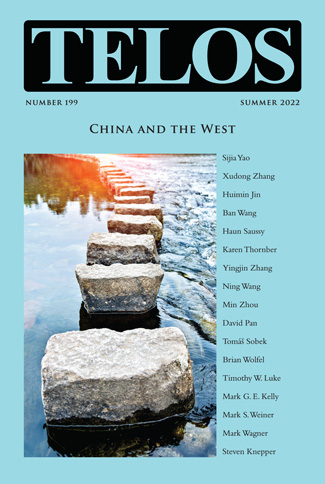Telos 199 (Summer 2022): China and the West is now available for purchase in our store. Individual subscriptions to Telos are also available in both print and online formats.
 The comparison of China and the West is in the first place a cultural problem to the extent that it requires a knowledge of both traditions and the ways in which they have related to each other. There has been a long history of interaction that has shaped the global economy from the times of the silk routes to the early modern push to find an alternative trade route to China in the European age of discovery and conquest. But the cultural comparison between China and the West today is inevitably overshadowed by a political dynamic in which the opposition reveals a rivalry that no longer exists, for instance, between Japan and the West. Indeed, the “West” in the opposition between China and the West could even be interpreted to include Japan or Taiwan. While the political opposition between China and the West may be reduced to the difference between authoritarianism and liberal democracy, this political dichotomy leads to cultural differences that result from the incompatibility between the two public spheres. While different public spheres will always manifest inconsistencies in terms of the problems and concerns that structure discussion and debate, China’s contemporary restrictions on free expression have separated it from the rest of the world in a more fundamental way by establishing an alternative version of historical facts. China’s alternative reality is not a consequence of its grounding in its distinctive cultural tradition but of the political decisions that have cut it off from the rest of the world. The attempt to compare China and the West must therefore take into account this politically enforced disjuncture.
The comparison of China and the West is in the first place a cultural problem to the extent that it requires a knowledge of both traditions and the ways in which they have related to each other. There has been a long history of interaction that has shaped the global economy from the times of the silk routes to the early modern push to find an alternative trade route to China in the European age of discovery and conquest. But the cultural comparison between China and the West today is inevitably overshadowed by a political dynamic in which the opposition reveals a rivalry that no longer exists, for instance, between Japan and the West. Indeed, the “West” in the opposition between China and the West could even be interpreted to include Japan or Taiwan. While the political opposition between China and the West may be reduced to the difference between authoritarianism and liberal democracy, this political dichotomy leads to cultural differences that result from the incompatibility between the two public spheres. While different public spheres will always manifest inconsistencies in terms of the problems and concerns that structure discussion and debate, China’s contemporary restrictions on free expression have separated it from the rest of the world in a more fundamental way by establishing an alternative version of historical facts. China’s alternative reality is not a consequence of its grounding in its distinctive cultural tradition but of the political decisions that have cut it off from the rest of the world. The attempt to compare China and the West must therefore take into account this politically enforced disjuncture.
It would be a mistake, though, to see China and the West as polar opposites or competing civilizations, separated by their opposing political interests on the one hand and by the history of each of their cultural traditions on the other hand. Even if they had separate long histories, the recent past has seen many more opportunities for interaction and orientation around common projects and problems. Moreover, since the past is always a projection from out of the present, the idea of a clash of civilizations is not a legacy but a project. An alternative endeavor would be to conceive of the relationship between China and the West as existing within a larger totality. The definition of such a totality must occur within a particular perspective, however, and therein lies the problem. China and the West are clearly competing to define the framework of global order. Consequently, any attempt to consider the relationship between the two must look to the vision of universality that each side is trying to establish against the other. This issue of Telos considers a variety of ways of defining the overarching perspective from which the comparison between China and the West makes sense.







